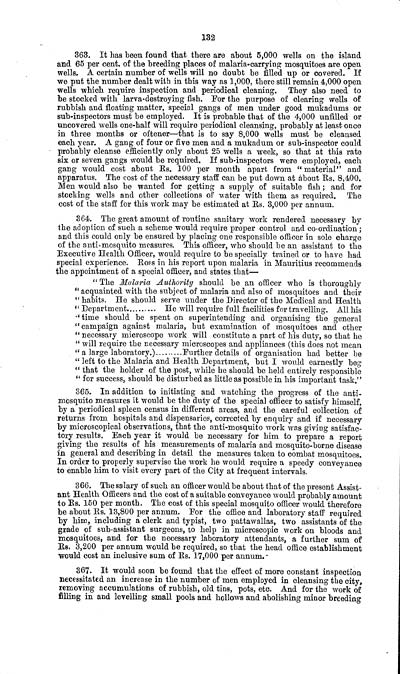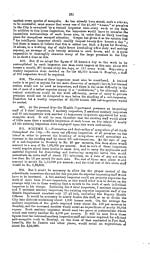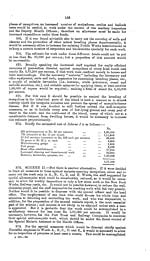Medicine - Disease > Report of an investigation into the causes of malaria in Bombay and the measures necessary for its control
(172) Page 132
Download files
Individual page:
Thumbnail gallery: Grid view | List view

132
363. It has been found that there are about 5,000 wells on the island
and 65 per cent. of the breeding places of malaria-carrying mosquitoes are open
wells. A certain number of wells will no doubt be filled up or covered. If
we put the number dealt with in this way as 1,000, there still remain 4,000 open
wells which require inspection and periodical cleaning. They also need to
be stocked with larva-destroying fish. For the purpose of clearing wells of
rubbish and floating matter, special gangs of men under good mukadums or
sub-inspectors must be employed. It is probable that of the 4,000 unfilled or
uncovered wells one-half will require periodical cleansing, probably at least once
in three months or oftener-that is to say 8,000 wells must be cleansed
each year. A gang of four or five men and a mukadum or sub-inspector could
probably cleanse efficiently only about 25 wells a week, so that at this rate
six or seven gangs would be required. If sub-inspectors were employed, each
gang would cost about Rs. 100 per month apart from "material" and
apparatus. The cost of the necessary staff can be put down at about Rs. 8,400.
Men would also be wanted for getting a supply of suitable fish; and for
stocking wells and other collections of water with them as required. The
cost of the staff for this work may be estimated at Rs. 3,000 per annum.
364. The great amount of routine sanitary work rendered necessary by
the adoption of such a scheme would require proper control and co-ordination;
and this could only be ensured by placing one responsible officer in sole charge
of the anti-mosquito measures. This officer, who should be an assistant to the
Executive Health Officer, would require to be specially trained or to have had
special experience. Ross in his report upon malaria in Mauritius recommends
the appointment of a special officer, and states that-
"The Malaria Authority should be an officer who is thoroughly
"acquainted with the subject of malaria and also of mosquitoes and their
"habits. He should serve under the Director of the Medical and Health
"Department.......... He will require full facilities for travelling. All his
"time should be spent on superintending and organising the general
"campaign against malaria, but examination of mosquitoes and other
"necessary microscope work will constitute a part of his duty, so that he
"will require the necessary microscopes and appliances (this does not mean
"a large laboratory.).........Further details of organisation had better be
"left to the Malaria and Health Department, but I would earnestly beg
"that the holder of the post, while he should be held entirely responsible
"for success, should be disturbed as little as possible in his important task."
365. In addition to initiating and watching the progress of the anti-
mosquito measures it would be the duty of the special officer to satisfy himself,
by a periodical spleen census in different areas, and the careful collection of
returns from hospitals and dispensaries, corrected by enquiry and if necessary
by microscopical observations, that the anti-mosquito work was giving satisfac-
tory results. Each year it would be necessary for him to prepare a report
giving the results of his measurements of malaria and mosquito-borne disease
in general and describing in detail the measures taken to combat mosquitoes.
In order to properly supervise the work he would require a speedy conveyance
to enable him to visit every part of the City at frequent intervals.
366. The salary of such an officer would be about that of the present Assist-
ant Health Officers and the cost of a suitable conveyance would probably amount
to Rs. 150 per month. The cost of this special mosquito officer would therefore
be about Rs. 13,800 per annum. For the office and laboratory staff required
by him, including a clerk and typist, two pattawallas, two assistants of the
grade of sub-assistant surgeons, to help in microscopic work on bloods and
mosquitoes, and for the necessary laboratory attendants, a further sum of
Rs. 3,200 per annum would be required, so that the head office establishment
would cost an inclusive sum of Rs. 17,000 per annum.
367. It would soon be found that the effect of more constant inspection
necessitated an increase in the number of men employed in cleansing the city,
removing accumulations of rubbish, old tins, pots, etc. And for the work of
filling in and levelling small pools and hollows and abolishing minor breeding
363. It has been found that there are about 5,000 wells on the island
and 65 per cent. of the breeding places of malaria-carrying mosquitoes are open
wells. A certain number of wells will no doubt be filled up or covered. If
we put the number dealt with in this way as 1,000, there still remain 4,000 open
wells which require inspection and periodical cleaning. They also need to
be stocked with larva-destroying fish. For the purpose of clearing wells of
rubbish and floating matter, special gangs of men under good mukadums or
sub-inspectors must be employed. It is probable that of the 4,000 unfilled or
uncovered wells one-half will require periodical cleansing, probably at least once
in three months or oftener-that is to say 8,000 wells must be cleansed
each year. A gang of four or five men and a mukadum or sub-inspector could
probably cleanse efficiently only about 25 wells a week, so that at this rate
six or seven gangs would be required. If sub-inspectors were employed, each
gang would cost about Rs. 100 per month apart from "material" and
apparatus. The cost of the necessary staff can be put down at about Rs. 8,400.
Men would also be wanted for getting a supply of suitable fish; and for
stocking wells and other collections of water with them as required. The
cost of the staff for this work may be estimated at Rs. 3,000 per annum.
364. The great amount of routine sanitary work rendered necessary by
the adoption of such a scheme would require proper control and co-ordination;
and this could only be ensured by placing one responsible officer in sole charge
of the anti-mosquito measures. This officer, who should be an assistant to the
Executive Health Officer, would require to be specially trained or to have had
special experience. Ross in his report upon malaria in Mauritius recommends
the appointment of a special officer, and states that-
"The Malaria Authority should be an officer who is thoroughly
"acquainted with the subject of malaria and also of mosquitoes and their
"habits. He should serve under the Director of the Medical and Health
"Department.......... He will require full facilities for travelling. All his
"time should be spent on superintending and organising the general
"campaign against malaria, but examination of mosquitoes and other
"necessary microscope work will constitute a part of his duty, so that he
"will require the necessary microscopes and appliances (this does not mean
"a large laboratory.).........Further details of organisation had better be
"left to the Malaria and Health Department, but I would earnestly beg
"that the holder of the post, while he should be held entirely responsible
"for success, should be disturbed as little as possible in his important task."
365. In addition to initiating and watching the progress of the anti-
mosquito measures it would be the duty of the special officer to satisfy himself,
by a periodical spleen census in different areas, and the careful collection of
returns from hospitals and dispensaries, corrected by enquiry and if necessary
by microscopical observations, that the anti-mosquito work was giving satisfac-
tory results. Each year it would be necessary for him to prepare a report
giving the results of his measurements of malaria and mosquito-borne disease
in general and describing in detail the measures taken to combat mosquitoes.
In order to properly supervise the work he would require a speedy conveyance
to enable him to visit every part of the City at frequent intervals.
366. The salary of such an officer would be about that of the present Assist-
ant Health Officers and the cost of a suitable conveyance would probably amount
to Rs. 150 per month. The cost of this special mosquito officer would therefore
be about Rs. 13,800 per annum. For the office and laboratory staff required
by him, including a clerk and typist, two pattawallas, two assistants of the
grade of sub-assistant surgeons, to help in microscopic work on bloods and
mosquitoes, and for the necessary laboratory attendants, a further sum of
Rs. 3,200 per annum would be required, so that the head office establishment
would cost an inclusive sum of Rs. 17,000 per annum.
367. It would soon be found that the effect of more constant inspection
necessitated an increase in the number of men employed in cleansing the city,
removing accumulations of rubbish, old tins, pots, etc. And for the work of
filling in and levelling small pools and hollows and abolishing minor breeding
Set display mode to: Large image | Zoom image | Transcription
Images and transcriptions on this page, including medium image downloads, may be used under the Creative Commons Attribution 4.0 International Licence unless otherwise stated. ![]()
| India Papers > Medicine - Disease > Report of an investigation into the causes of malaria in Bombay and the measures necessary for its control > (172) Page 132 |
|---|
| Permanent URL | https://digital.nls.uk/74573340 |
|---|




